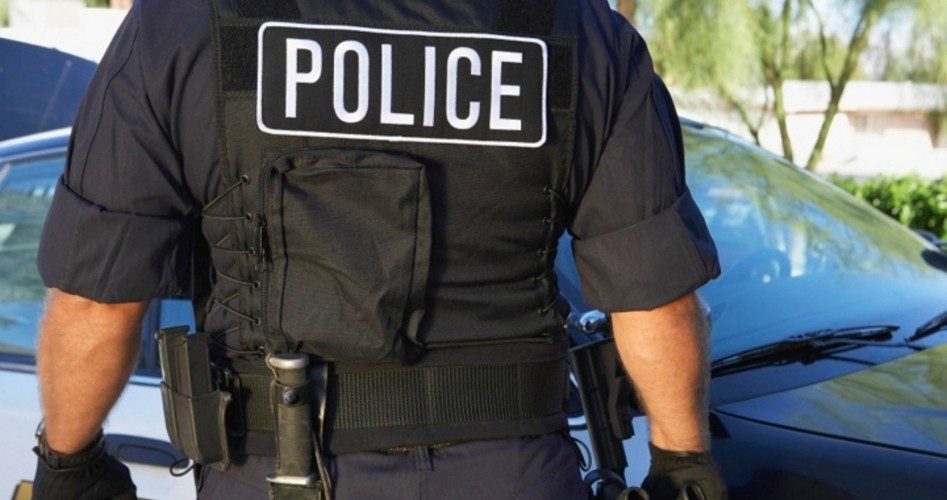
The results from Gallup’s annual poll on crime were released last week, and they showed greatly increased support for local police all across the board, regardless of demographics or political persuasion. The double-digit surge over last year was measured by responses to several questions asked in early October, including “How much respect do you have for the police in your area — a great deal, some, or hardly any?” Last year, 64 percent of those polled responded “a great deal,” while this year the percentage jumped to 76 percent, a gain of 12 points and the highest in nearly 50 years.
When sorted according to race, the response to that question was equally positive: Whites’ respect last year was 69 percent, which jumped to 80 percent; nonwhites’ respect was 53 percent last year, and this year it came in at 67 percent.
When sorted by political affiliation and philosophy, the results were the same: Respect for local police rose among conservatives, moderates, liberals, Republicans, Independents, and Democrats. The highlight of the study was the jump in respect among Liberals (those presumably most supportive of efforts by groups such as Black Lives Matter to denigrate local police), which leapt from 50 percent a year ago to 71 percent this year.
When sorted by age, the increase in respect showed up across the spectrum: Among those age 55 and older, it increased by four percent; among those between age 35 and 44, it increased by 16 percent; and among those age 18 to 34, by 19 percent.
It didn’t matter where respondents resided, either. Respect for local police increased among those living in a large city, a suburb, a small town, or in a rural area.
Justin McCarthy, writing for Gallup, expressed his surprise at the results: “The sharp increase over the past year in professed respect for local law enforcement comes as many police say they feel they are on the defensive — both politically and for their lives while they are on duty — amid heated national discussions on police brutality and shootings.”
Criminology professor Laurie Robinson at George Mason University looked at the poll results and noted: “Some of [the increase] is the rallying support of law enforcement in the wake of the shootings [of police this year]. The optimist in me thinks it’s more than just a knee-jerk rallying and really has to do with reflection on what the role of police should be and the complex challenges they face.”
To members of Support Your Local Police (SYLP) committees, sponsored by The John Birch Society, those challenges aren’t all that “complex” once the forces behind the attacks on the thin blue line are understood. Its website explains: “Police dependent upon the federal government have much less accountability to the local communities they serve…. [Our efforts seek to educate citizens] on the importance of keeping police independent and accountable to local communities [and their role] in protecting citizens against federal tyranny.”
The decades-long attack on that independence was moved to a higher level with the creation of the Black Lives Matter Movement, founded by Marxists and funded by George Soros and the Ford Foundation. BLM has made crystal clear whom it is targeting. At a December 2014 rally in New York City, BLM marchers chanted, “What do we want? Dead cops! When do we want it? Now!”
At another BLM “rally,” the “protesters” chanted, “Pigs in a blanket, fry ‘em like bacon.”
Their goal from the beginning has been to break the bond of trust created over the years between local police and local citizens in order to lay the groundwork for a federal or national takeover of law-enforcement activities.
One of those whom Gallup failed to include in its poll is Democrat presidential candidate Hillary Rodham Clinton. In September the Fraternal Order of Police (FOP) sent her campaign a questionnaire asking about her position on local law enforcement, the results of which it would use to decide if she was worthy of their endorsement. The FOP, with 325,000 members in more than 2,100 chapters nationwide, didn’t hear back. They “blew us off,” stated John McNesby, president of the FOP chapter in Philadelphia. McNesby is one of three leaders of the FOP who decides which candidate to endorse. He asserted: “They [the Clinton campaign] didn’t care. Their attitude, then, back in July, during the DNC, was: They were going to win this thing anyway, so who cares [about the FOP endorsement]?”
It got worse. Repeated attempts to elicit a response from the Clinton campaign finally succeeded. The e-mails, said McNesby, “were that they’re not interested and no, thanks. Just snide things like that.”
Clinton’s attitude toward law enforcement was revealed further in the 100 pages of documents released by the FBI on Monday, October 17. One of those documents included summaries of interviews with Diplomatic Security (DS) officers tasked with protecting Clinton while she was secretary of state. During one interview, the following took place:
[One of those DS officers] explained that Clinton’s treatment of DS agents in her protective detail was so contemptuous that many of them sought reassignment or employment elsewhere. Prior to Clinton’s tenure, being an agent on the Secretary of State’s protective detail was seen as an honor and a privilege reserved for senior agents.
However, by the end of Clinton’s tenure, it was staffed largely with new agents because it was difficult to find senior agents willing to work for her.
The narrative that local police are the problem isn’t being bought by the average American, according to Gallup. That must be most aggravating to members of the BLM and its supporters such as Hillary Clinton, for their message not only isn’t getting through, it’s being rejected outright.
An Ivy League graduate and former investment advisor, Bob is a regular contributor to The New American magazine and blogs frequently at LightFromTheRight.com, primarily on economics and politics. He can be reached at [email protected].




